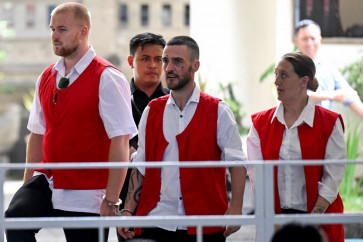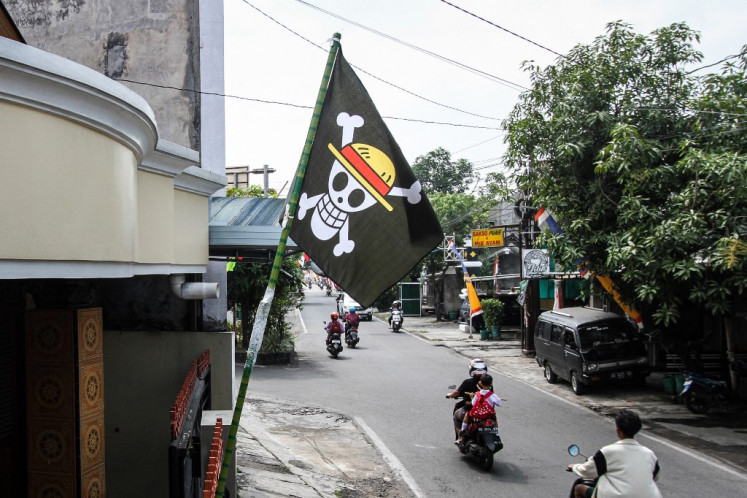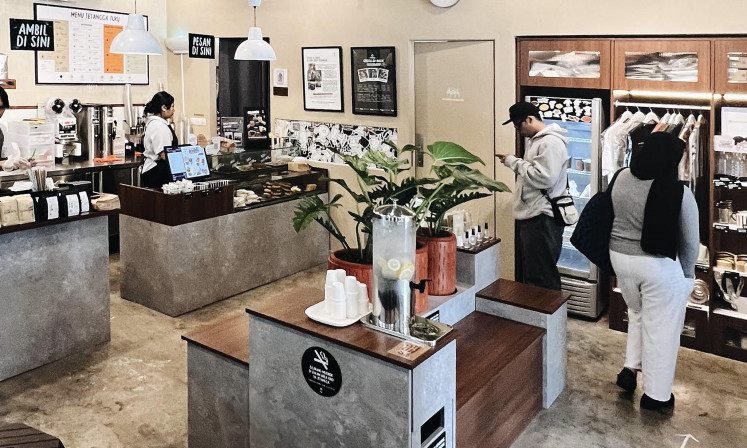Popular Reads
Top Results
Can't find what you're looking for?
View all search resultsPopular Reads
Top Results
Can't find what you're looking for?
View all search resultsCSIS does not decline with age: Co-founder
Daoed Joesoef: JP/Wendra AjistyatamaThe Jakarta Post’s Yohanna Ririhena talked with Daoed Joesoef, a former minister of education and culture, and cofounder of the Centre for Strategic and International Studies (CSIS), on Wednesday, on the role of the think tank: How did the first idea of forming the CSIS come about?Some Indonesian students who obtained scholarships to several countries in Europe, including myself, felt that we should contribute something after we finished our studies, and not only bring home our degrees
Change text size
Gift Premium Articles
to Anyone
D
span class="caption" style="width: 248px;">Daoed Joesoef: JP/Wendra AjistyatamaThe Jakarta Post’s Yohanna Ririhena talked with Daoed Joesoef, a former minister of education and culture, and cofounder of the Centre for Strategic and International Studies (CSIS), on Wednesday, on the role of the think tank:
How did the first idea of forming the CSIS come about?
Some Indonesian students who obtained scholarships to several countries in Europe, including myself, felt that we should contribute something after we finished our studies, and not only bring home our degrees. During the summer recess, we held discussions on several issues, including politics, economics and strategy. We shared our knowledge and discussed how each issue would impact on Indonesia. We wrote articles and books, and sent them to Indonesia.
At the same time, in Jakarta, there were study clubs which had similar interests. Among those involved were Harry Tjan Silalahi, Jusuf Wanandi, and Sofyan Wanandi, who read our articles.
That was our first encounter with them. We knew each other through our writings. We met and came up with a dream to institutionalize our discussions.
I finished my studies at the Sorbonne at the end of 1972, and came home. Hadi Soesastro, one of the leading activists in our study club in Europe had returned to Indonesia a year earlier. With other friends, we decided to found the Centre for Strategic and International Studies (CSIS).
Why did CSIS focus on strategic issues?
Our Constitution states that we should contribute to the establishment of a world order based on freedom, abiding peace and social justice and national independence. Realizing those principles needs concepts and ideas. We felt that it was not only the task of the state to do this.
We developed concepts and disseminated them. We sent the results of our studies and research to related departments and institutions. It was then up to them if they wanted to accept our report or not.
Although foreigners appreciated our work, there were groups in Indonesia that still eyed us suspiciously. They called us atheists, especially when I served as minister of education and culture.
Were CSIS’ studies used by the government?
One of them was about ASEAN. ASEAN used to come under the domain of the foreign department. I visited Pak Harto [President Soeharto] and suggested that the region’s populations should be informed about ASEAN. ASEAN is not only about political matters, it relates to people’s lives. So, we visited several ASEAN countries to educate people about the organization’s concept.
Were you frequently called by the president?
Sometimes. Even though the government didn’t ask for them, we used to send our articles and reports to government institutions. We don’t know if they threw them out with the trash.
Are the perceptions correct that CSIS gave input for the government’s decision to invade East Timor?
Frankly speaking yes, we contributed to it. We put forward several suggestions and alternatives but it was the government who made the final decision. We were not members of the cabinet. Every decision has its consequence. Every solution creates a new problem. We gave our opinion, but the decision was in the government’s hand; it did not lay with CSIS.
When I held the position as minister of education and culture, I did make decisions with that scope.
This is why some people are cynical toward us. In French, there is a folktale about a thirsty wolf. When the wolf finds a vineyard, but cannot reach the grapes, then he says the grapes were sour, just because he could not eat them.
Did General Benny Murdani come to CSIS to have consultation?
Yes, he frequently visited to have discussions with us. But it was not only Benny. There were other generals, too, who wanted to broaden their minds, namely the thinking officials.
There is a perception that CSIS has declined in terms of influence?
I don’t agree to the perception that CSIS has declined. It still conducts international seminars, discussions, and so on. In the past, people predicted that CSIS would disappear when Ali Moertopo died, but it did not. We still exist. But now everything is more expensive. We could develop more if we had more financial support.










